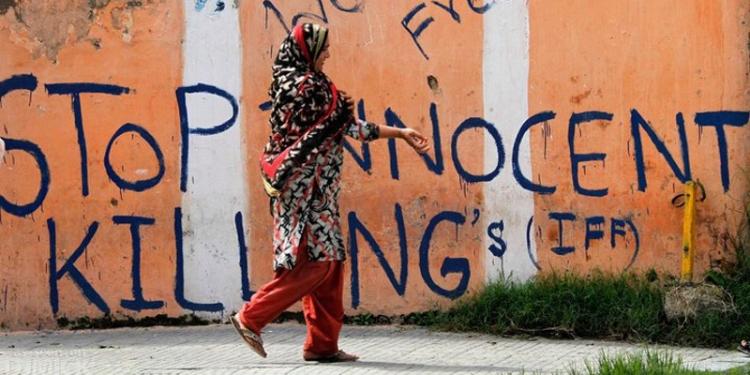
Indian-administered Kashmir was plunged back into internet darkness Sept. 2 as India’s central authorities enforced lockdowns and a news blackout following the death of Syed Ali Geelani, a prominent separatist leader. Geelani, 91, died at his home the day before. His body was immediately seized by authorities, and buried in a quiet funeral held under harsh restrictions. His son, Naseem Geelani, said the family had planned to bury him at the main martyrs’ cemetery in Srinagar, as specified in his will, but was not allowed to do so. Police also charged family members under an anti-terrorism law for wrapping his body in the Pakistani flag and raising anti-India slogans. Kashmir spent months without internet following an August 2019 crackdown. High-speed mobile internet was only restored earlier this year. (TNH, AP, The Guardian)
Geelani had been repeatedly detained or placed under house arrest in recent years as unrest has mounted in Kashmir.
Photo: Kashmir Global via Nationalia





Mass detention in Kashmir
Security forces in Indian Kashmir have detained more than 300 people for questioning in recent days following a wave of targeted killings that has spread panic among minority groups in the contested region. Three Hindus and a Sikh were killed in the Muslim-majority region this week, leading authorities to say that religious minorities are being targeted.
Small groups of militants armed with pistols have carried out a spate of killings in recent weeks, taking the number of civilians murdered in Indian Kashmir this year to at least 28, according to police records. (Reuters)
On Oct. 11, five Indian army troops were killed as they carried out an operation in a village in the district of Poonch near the Line of Control. (BBC News)
Kashmir militants slain in police operation
Three supposed militants of The Resistance Front were killed by police in an operation carried out in a busy marketplace in Srinagar Nov. 24. Police said the three were involved in recent armed attacks, including last month’s killing of a teacher and principal at a Srinagar secondary school. (The Hindu)
Journalist faces charges in Kashmir
The arrest of a Kashmiri journalist has drawn concern about human rights in the conflicted Indian state. Fahad Shah, editor of The Kashmir Walla, was arrested Feb. 4 and faces a range of accusations, including under India’s controversial anti-terror laws. Press freedom groups are calling for Shah’s release. Journalists say authorities in Indian-administered Kashmir are increasingly targeting reporters. (TNH)
New violence in Kashmir
A series of apparent targeted attacks on the Hindus in Indian-administered Kashmir has sent shockwaves through the region’s minority community, prompting hundreds to leave. Since the abrogation of Indian-administered Kashmir’s limited autonomy in 2019, the region has witnessed a spike in violence against Kashmiri Hindus, known locally as Pandits. (Al Jazeera)
Violence broke out in Kashmir last week after separatist leader Mohammed Yasin Malik was sentenced to life in prison on May 25. A Delhi court found Malik guilty of funding terrorism, among other crimes— charges he derided as politically motivated. Police fired tear-gas at protesters in Srinagar, some of whom reportedly threw stones. Security forces later arrested at least 10 in midnight raids under the harsh anti-terrorist law, UAPA. (TNH)